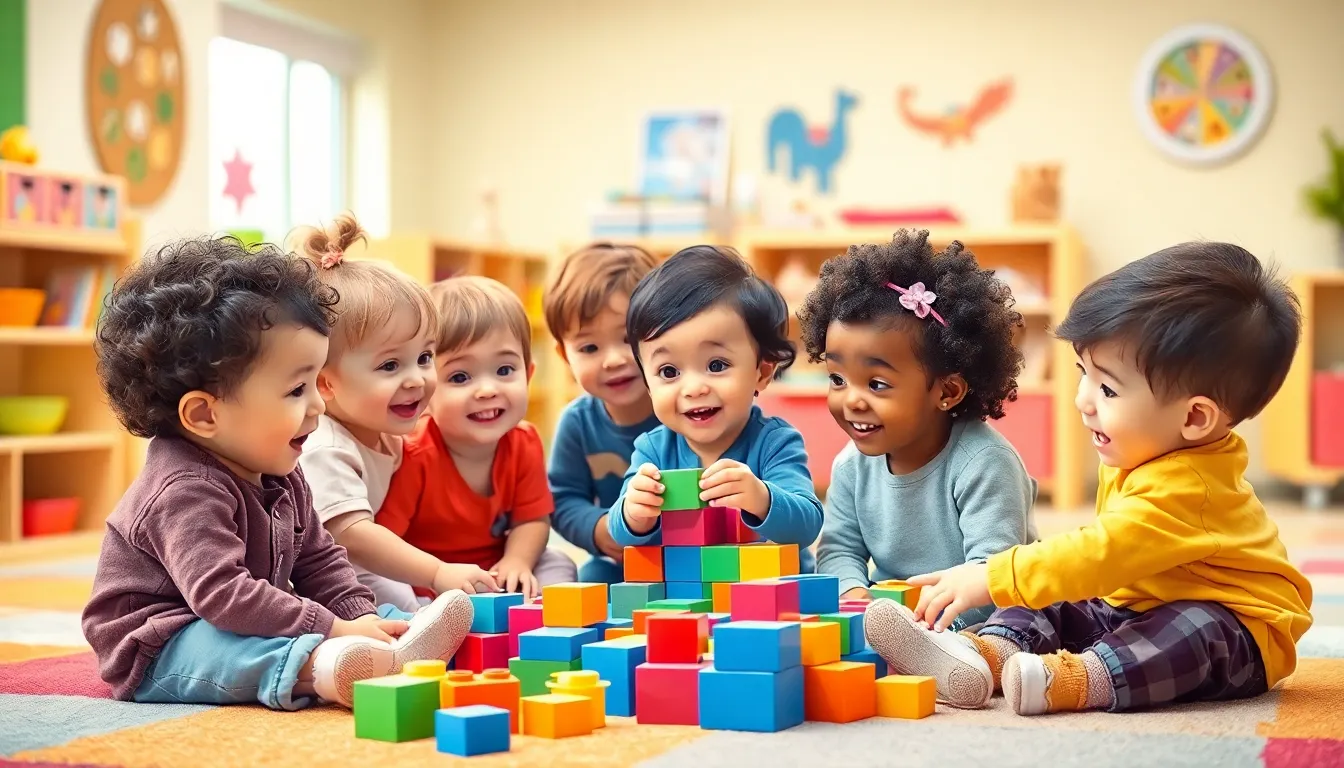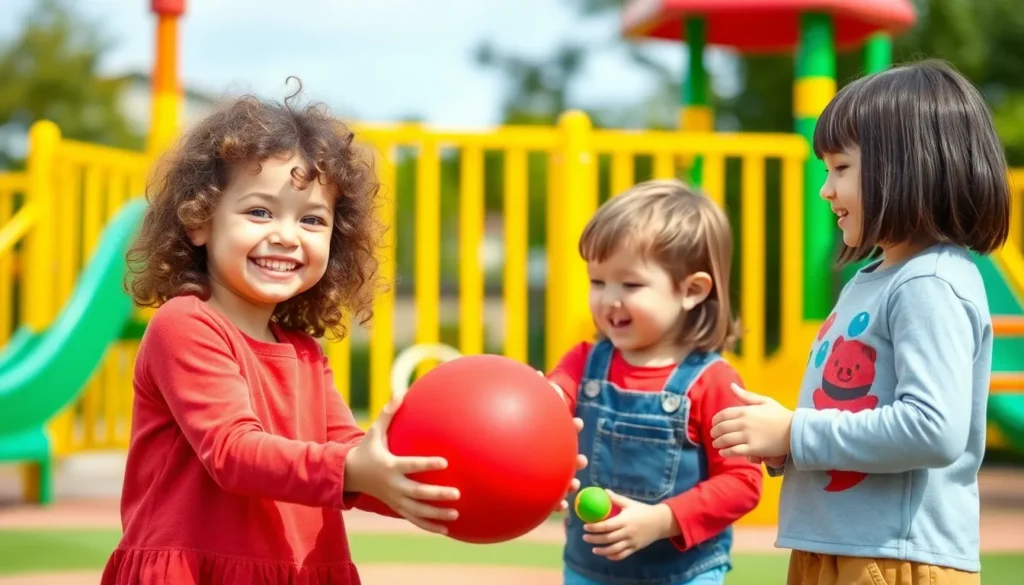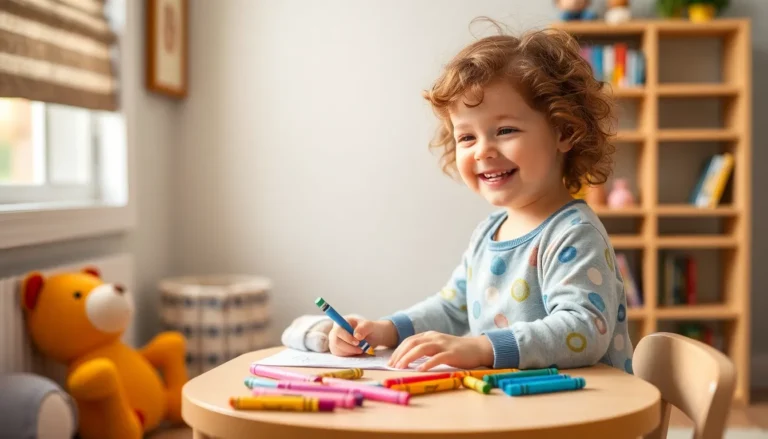Table of Contents
ToggleNavigating the world of toddler social skills can feel like trying to herd cats—adorable but chaotic. As little ones explore their surroundings, they’re not just learning to walk or talk; they’re also mastering the fine art of sharing, taking turns, and the occasional dramatic meltdown. These early interactions lay the groundwork for future relationships, so it’s crucial to get it right.
Understanding Toddler Social Skills
Toddlers develop crucial social skills that shape their interactions. These foundational skills play a significant role in their future relationships.
Importance of Social Skills in Early Childhood
Social skills in early childhood support communication and emotional understanding. They enable toddlers to express feelings and form connections with peers. Positive interactions foster empathy, leading to cooperative behaviors. Sharing toys improves negotiation skills, while understanding personal space enhances respect for others. Research shows that strong social abilities correlate with later academic success. Children with well-developed social skills often adapt more easily to school environments. Each skill learned during these formative years builds confidence in social settings.
Key Developmental Stages
Social skills develop in distinct stages throughout toddlerhood. At 1-2 years, toddlers typically engage in parallel play, observing peers while playing separately. By age 2-3, cooperative play emerges with shared activities. Encouraging group play strengthens teamwork and communication. During 3-4 years, children initiate friendships and display preferences for playmates. This age marks the beginning of turn-taking and sharing, crucial for conflict resolution. Mastery of these stages leads to smoother transitions into structured social settings. Continued guidance during these phases enhances self-regulation and social awareness.
Types of Toddler Social Skills

Toddler social skills encompass various areas that contribute to effective interactions with others. These skills develop over time and play a crucial role in shaping future relationships.
Communication Skills
Communication skills in toddlers include verbal and non-verbal interactions. They learn to express needs through words and gestures, using simple sentences to convey thoughts. Toddlers also begin to understand turn-taking in conversations. By age 2, many demonstrate increased vocabulary and attempt to articulate their feelings. Encouragement from caregivers during storytelling enhances listening skills. Positive social exchanges can further solidify their ability to initiate conversations. Overall, these foundational communication abilities support social engagement with peers and adults alike.
Emotional Skills
Emotional skills in toddlers revolve around recognizing and expressing feelings. They start identifying emotions through facial expressions and body language. Additionally, empathy becomes noticeable as toddlers learn to respond to peers in distress. By age 3, many can label basic emotions such as happiness, sadness, and anger. Caregivers who model emotional expression help toddlers develop this skill. Guided experiences enable toddlers to navigate complex emotional situations, fostering a deeper understanding of their own feelings and those of others. Such emotional intelligence enhances future social interactions.
Interactive Skills
Interactive skills focus on how toddlers engage with peers in play. Shared activities, like playing with blocks or drawing, encourage cooperation and teamwork. By age 2, they typically participate in parallel play, observing rather than directly engaging. As toddlers progress to ages 3-4, cooperative play becomes more frequent, marked by shared goals and communication. Initiating playdates can help support these interactions and strengthen friendships. Participation in group settings encourages taking turns and sharing, which are critical for resolving conflicts. Mastery of interactive skills builds a solid foundation for ongoing social development.
Strategies to Enhance Toddler Social Skills
Enhancing toddler social skills requires intentional strategies. Various methods engage toddlers effectively and promote their social growth.
Play-Based Learning
Play serves as a primary avenue for social skill development. During play, toddlers naturally practice sharing, communication, and cooperation. Engaging in group activities like building blocks or role-playing offers rich opportunities for interaction. This kind of learning encourages toddlers to experiment with social roles while understanding different perspectives. Moreover, guided play can incorporate educational themes, reinforcing concepts like teamwork and empathy.
Structured Activities
Structured activities provide clear guidelines for social interactions. Group games, arts and crafts, or story time enable toddlers to follow rules while interacting with peers. These activities foster a sense of community as toddlers learn to take turns and respect others’ space. Organizing playdates or small group gatherings bolsters these structured experiences. Facilitators can create a supportive environment where toddlers practice negotiation skills and resolve conflicts.
Modeling Behavior
Modeling behavior significantly influences toddlers’ social skill acquisition. Caregivers demonstrate how to interact positively by engaging in conversations and showing empathy. By using real-life scenarios, adults showcase effective communication, turn-taking, and sharing. When they prioritize respectful interactions, toddlers observe and mirror these behaviors. Frequent feedback reinforces this learning, building a foundation for healthy social interactions throughout life.
Common Challenges in Developing Social Skills
Developing social skills poses several challenges for toddlers. Understanding these challenges helps caregivers provide appropriate support.
Social Anxiety and Shyness
Social anxiety manifests as a reluctance to engage in social interactions. Shy toddlers may avoid group situations, preferring to observe rather than participate. Being around unfamiliar peers can heighten their anxiety. Encouraging gradual exposure to social settings promotes comfort and confidence. Caregivers can help by arranging playdates with familiar children, creating reassuring environments. Positive reinforcement during interactions builds trust and reduces fear.
Difficulty in Sharing and Turn-Taking
Sharing and turn-taking often presents significant challenges for toddlers. These skills require understanding others’ needs and patience, which develop over time. Many toddlers struggle with the concept of sharing toys, focusing instead on their own desires. Practicing turn-taking during games helps children grasp these concepts. Engaging in structured activities teaches the importance of sharing, emphasizing fairness and cooperation. Caregivers can model these behaviors, highlighting the joy of playing together. Providing gentle reminders during play fosters a collaborative atmosphere that encourages learning.
Fostering toddler social skills is vital for their overall development. By engaging in play-based learning and structured activities, caregivers can create enriching environments that promote sharing, communication, and emotional understanding. Positive interactions during these formative years lay the groundwork for healthy relationships and academic success later in life.
As toddlers navigate their social worlds, it’s important for caregivers to model respectful behavior and provide guidance. With patience and encouragement, toddlers can overcome challenges like shyness and learn essential skills that will benefit them throughout their lives. Prioritizing social skill development ensures that toddlers grow into confident and empathetic individuals ready to connect with others.







